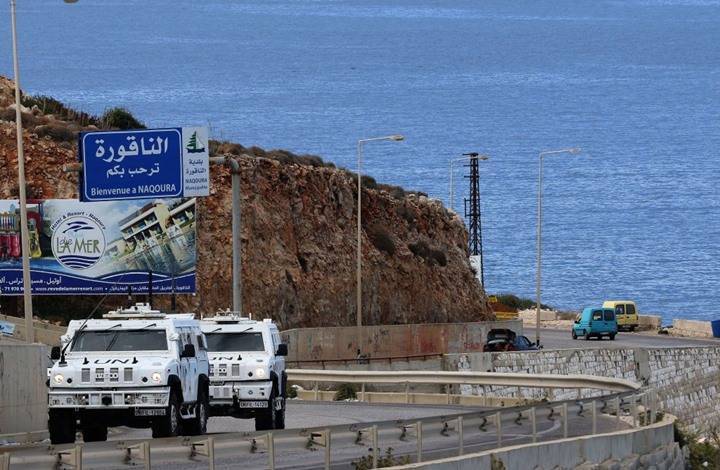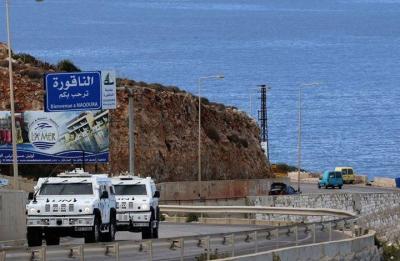The coming weeks are likely to be eventful regarding the border demarcation issue. At least, this is what Lebanon seeks, especially after Israel began drilling operations in the Karish field while Hezbollah has increased pressure by initially sending drones and subsequently, Secretary-General Hassan Nasrallah announced the "political and non-political mobilization to safeguard Lebanon's rights at sea," asserting that "the resistance will not remain idle and all options are open."
Simultaneously, Hezbollah decided to revert to line 29 but without officially or internationally formalizing it, instead opting to remind that Lebanon has rights over the area of Ras al-Naqoura and the B1 border point, which marks the beginning of the border line between Lebanon and Israel as outlined in international agreements, including one from 1923. This demarcation was established and marked, similar to what happened with the Blue Line. It has historically separated Palestine from Lebanon since the time of the French mandate over Lebanon and the British mandate over Palestine, with Israel having moved it northward by approximately 35 meters long ago, which is deemed an infringement on Lebanese sovereignty.
The significance of this point lies in its establishment of Ras al-Naqoura as a boundary starting point, and shifting the B1 point northwards undermines Ras al-Naqoura's role as a border point. More importantly, adopting this point along with Ras al-Naqoura means reverting to line 29, as maritime boundary demarcation considers a fundamental reference point located on land. Therefore, starting from here inevitably leads to line 29, consequently legitimizing Lebanon's claim that the "Karish" field is disputed.
While waiting for U.S. envoy Amos Hochstein to return to Beirut with the Israeli response, the legislative body is set to meet next Tuesday to discuss two expedited and repeated law proposals aiming to formalize line 29, although the atmosphere surrounding the indirect negotiations does not appear very encouraging. There are increasing fears that the outcome of Hochstein's shuttling rounds may present Lebanon with choices that are less than favorable, potentially starting with a new framework agreement, but this time within a limited space between two lines: the "Hoff" line and line 23, following the dismissal of line 29 and the formal acknowledgment by the Lebanese government that line 23 is its border line.
The likely scenario suggests that the Israelis may introduce a new line for negotiation if an agreement is reached regarding the return to indirect negotiations within a new framework, using legal justifications that would allow them to bypass Lebanon's legal stance. This new line is anticipated to be winding, granting Lebanon part of the Qana field, in exchange for relinquishing part of Block 8, which is known to be rich in gas.
Thus, strengthening Lebanon's negotiating position through the formalization of line 29 is crucial. The first proposal on the legislative agenda aims to amend Article 17 of Law No. 163/2011 to include a map and coordinates delineating the southern territorial waters and exclusive economic zone according to the line defined by the Hydrographic Department of the Lebanese Army known as line 29, presented by MP Hassan Mourad.
The second proposal seeks to amend Article 6 of Law No. 163/2011 (defining the exclusive economic zone) and is presented by MP Paula Yacoubian.
In reality, it has become clear that the call for solidifying line 29 aims to bolster Lebanon's negotiating stance with legal arguments that prevent Israeli claims from overpowering Lebanese positions during negotiations. Hence, some MPs have pushed for amendments to Law 163/2011 after all attempts to amend Decree 6433 by the executive authority fell through.
Proponents of the amendment and confirmation of line 29 believe that the legislative session presents a serious opportunity for the Lebanese state to improve its position by strengthening its legal arguments. However, there are obstacles likely to arise once the proposals are presented. The first of these obstacles is the sheer number of proposals, which may lead Speaker Nabih Berri to refer both proposals to parliamentary committees for further study. Therefore, it is advisable for the concerned MPs to preempt this by agreeing to merge the two proposals since they aim for the same goal.
The second obstacle is the fear that both proposals may be rejected on the grounds that Lebanon is amid negotiations, and thus, it would not be appropriate to amend maritime borders. However, this hurdle can be overcome by including a provision in the law stating that modifications to the coordinates can be made through a decree issued by the Council of Ministers based on the outcomes of ongoing negotiations, noting that a similar discussion took place in 2018 regarding whether coordinates should be documented in a law or a decree, with the latter being the chosen route at the time.




